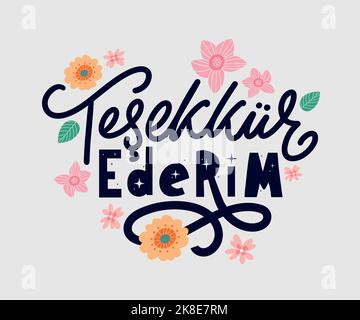Mastering 'Danke Auf Türkisch': Your Essential Guide To Expressing Gratitude
The Universal "Thank You": Teşekkür Ederim & Teşekkürler
When in doubt, start with the most common and universally accepted way to say "thank you" in Turkish: **`teşekkür ederim`**. * **Pronunciation:** `te-shek-kyoor eh-deh-reem` * **Usage:** This is the standard, formal, and polite way to express thanks. You can use it in almost any situation, whether you're thanking a shopkeeper, a waiter, an elder, or someone you don't know well. It's the safest bet for anyone learning Turkish. For example: * "Here's your coffee." -> `Teşekkür ederim.` (Thank you.) * "Can I help you with that bag?" -> `Evet, teşekkür ederim.` (Yes, thank you.) A slightly shorter and often used variant, especially in less formal but still polite contexts, is **`teşekkürler`**. * **Pronunciation:** `te-shek-kyoor-ler` * **Usage:** This is a more casual, yet still respectful, way to say thanks. It's often used among friends, family, or in everyday interactions where a full `teşekkür ederim` might feel a bit too formal. Think of it like saying "thanks" instead of "thank you very much." For example: * "Here's your change." -> `Teşekkürler.` (Thanks.) * "See you tomorrow!" -> `Görüşürüz, teşekkürler!` (See you, thanks!) While `teşekkürler` is a common way to say "the word 'danke' in Turkish," `teşekkür ederim` is the full verbal expression. Both are essential to know.The Informal and Heartfelt: Sağ Ol
While `teşekkür ederim` is always a safe choice, the Turkish language offers a charming informal alternative: **`sağ ol`**. * **Pronunciation:** `saah ol` (the 'ğ' is very soft, almost silent, lengthening the 'a' sound) * **Literal Meaning:** "Be healthy" or "may you be healthy." * **Usage:** This phrase is widely used among friends, family, and people you address informally (using the `sen` form, similar to `duzt` in German). It conveys a warm, genuine sense of gratitude. **Crucial Note:** It is important to remember that `sağ ol` should *only* be used when you're addressing someone informally, usually a single person. If you're addressing multiple people or someone formally, you would use `sağ olun` (pronounced `saah oh-loon`). Using `sağ ol` in a formal setting can be considered impolite, as it implies an inappropriate level of familiarity. Examples of `sağ ol` in use: * "Here's your drink, friend." -> `Sağ ol!` (Thanks!) * "You helped me a lot with that." -> `Gerçekten sağ ol!` (Really, thank you! / Thank you very much!) * The word `gerçekten` means "really," emphasizing the gratitude. This is a simple yet heartfelt way to say thank you. Remember, `sağ ol` is a common phrase used to express thanks informally, reflecting a wish for the other person's well-being.Beyond the Basics: Alternative Ways to Show Appreciation
Turkish offers a rich tapestry of expressions to convey appreciation, depending on the situation and the depth of your gratitude.Eksik Olma
For a truly heartfelt and somewhat poetic expression of gratitude, you might hear or want to use **`eksik olma`**. * **Pronunciation:** `ek-seek ol-mah` * **Literal Meaning:** "May you not be missing" or "may you always be there." * **Usage:** This phrase beautifully translates to something like "may you not be missing" or "may you always be there," implying deep appreciation and a wish for the person's continued well-being and presence. It's often used when someone has gone out of their way to help you, or when you feel a profound sense of gratitude for their support or kindness. It's a charming and warm way to show you truly value someone.Expressing Thanks for Specific Actions
While `teşekkür ederim` can be used for anything, you can also specify what you're thankful for. The structure often involves the noun or gerund of the action followed by `için teşekkür ederim` (for... thank you). For example, if you wanted to express gratitude for a pleasant stay, similar to the German "Danke für den schönen aufenthalt," you might say: * `Güzel konaklama için teşekkür ederim.` (Thank you for the beautiful stay.) Or for a helpful remark, like "Danke für deine treffende bemerkung": * `Yerinde tespitiniz için teşekkür ederim.` (Thank you for your spot-on observation.) These phrases demonstrate a deeper understanding and appreciation of the specific help or kindness received.Why is it Important to Learn These Phrases?
Learning how to express gratitude in Turkish goes beyond mere politeness; it's a bridge to cultural understanding and connection. * **Cultural Politeness:** As mentioned, Turks are very polite and often say thank you. Responding in kind shows respect and appreciation for their customs. * **Building Connections:** Whether you're traveling, living in Turkey, or interacting with Turkish friends, using their language to express thanks fosters stronger relationships and leaves a positive impression. Even if you only know a few basic phrases, the effort is genuinely appreciated. * **Enhancing Your Experience:** Imagine being able to thank a street vendor for a delicious simit, a helpful stranger for directions, or a host for their incredible hospitality. These small interactions become much more meaningful when you can express your gratitude directly. * **Overcoming Language Barriers:** Even if your Turkish is limited, mastering these key phrases allows you to communicate basic but crucial sentiments. Someone who is just starting to learn Turkish, perhaps understanding only standard communication but struggling with complex news or films, will find these simple phrases incredibly empowering.Tips for Learning and Using Turkish Gratitude Phrases
1. **Listen Actively:** Pay attention to how native speakers use these phrases in different situations. Notice their tone and body language. 2. **Practice Pronunciation:** Turkish is a phonetic language, so once you learn the sounds, it becomes easier. Don't be afraid to try! Most Turks appreciate the effort, even if your pronunciation isn't perfect. 3. **Use Context:** Pay attention to the formality of the situation. When in doubt, `teşekkür ederim` is always safe. 4. **Don't Overthink It:** Start with the basics and gradually add more expressions as you become comfortable. The goal is to communicate, not to achieve perfection instantly. 5. **Utilize Resources:** Online dictionaries and translation tools can be helpful for looking up specific words or phrases, but remember that context and cultural nuance are key, especially for phrases like `sağ ol` and `eksik olma`.Final Thoughts
From the formal `teşekkür ederim` to the informal `sağ ol` and the heartfelt `eksik olma`, the Turkish language offers a beautiful array of ways to express gratitude. Learning these phrases is an invaluable step towards connecting with Turkish culture and its warm, hospitable people. So go ahead, practice saying `teşekkür ederim`, and open the door to more meaningful interactions on your Turkish journey.
Text auf Türkisch: Danke. Beschriftung. Abbildung mit Tinte. Moderne

Text auf Türkisch: Danke. Beschriftung. Abbildung mit Tinte. Moderne

Wie man sich auf Türkisch bedankt